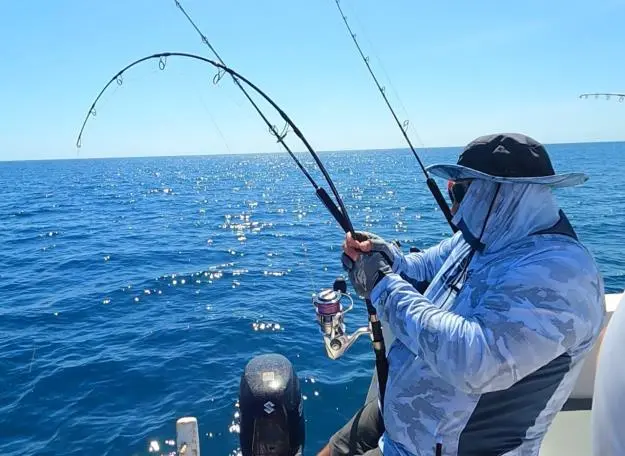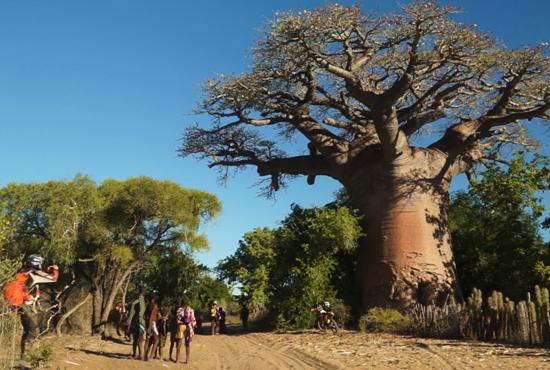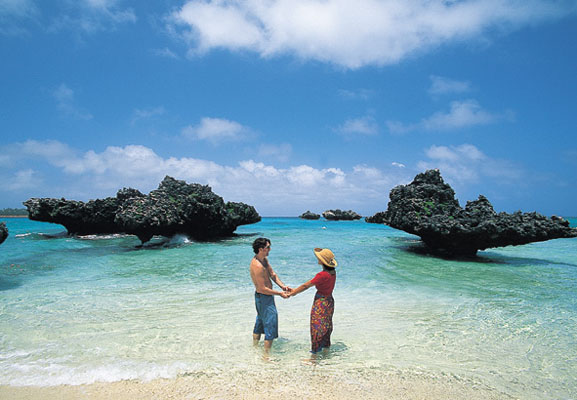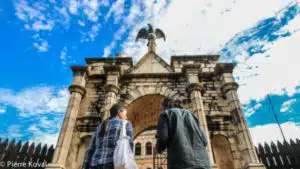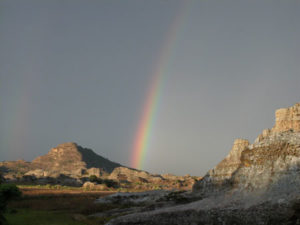The Pirate Republic of Libertalia in Madagascar
The Madagascan Republic of Libertalia was a society founded by pirates that abolished all distinctions based on race, religion, and class.
It was short-lived and had a dramatic end, but it inspired many writers and posed a real challenge for historians.
Historical Background
The first East India Company annexed Madagascar in 1642 and established their trading posts in the south and east of the island.

Even before their century and their time, these men plan to rewrite the laws of their society on land, where only the sea sets them free.
They break free from tyranny and slavery, secretly choosing the magnificent Bay of Diego Suarez in northern Madagascar as the cradle of their utopian republic (presumed to be the exact location of the Republic of Libertalia).
Populated with beauties of mixed races, it will be ephemeral and elusive, the stronghold of a humanistic republic founded on egalitarian principles.
Establishment of the Republic in 1685: Its name will be Libertalia.
It is the story of a pirate colony like no other in history, traditional history has not considered that brutal and described as bloodthirsty individuals, most of whom have abandoned their homeland and have a price on their head, would try to create a fairer society.
Because in reality, it is the story of two pirate “philosophers” and the action takes place away from the. In the so-called civilized societies, an extraordinary adventure took place in Madagascar, more precisely in the Bay of Diego-Suarez, one of the largest, most beautiful, and best-protected bays in the world, isolated for its time.
The Frigate “La Victoire”
It is the year 1680, and Olivier MISSON, a French gentleman from an old Provençal family, well-educated and in love with utopia, managed to embark on the frigate “La Victoire” commanded by his uncle, Monsieur de Forbin.
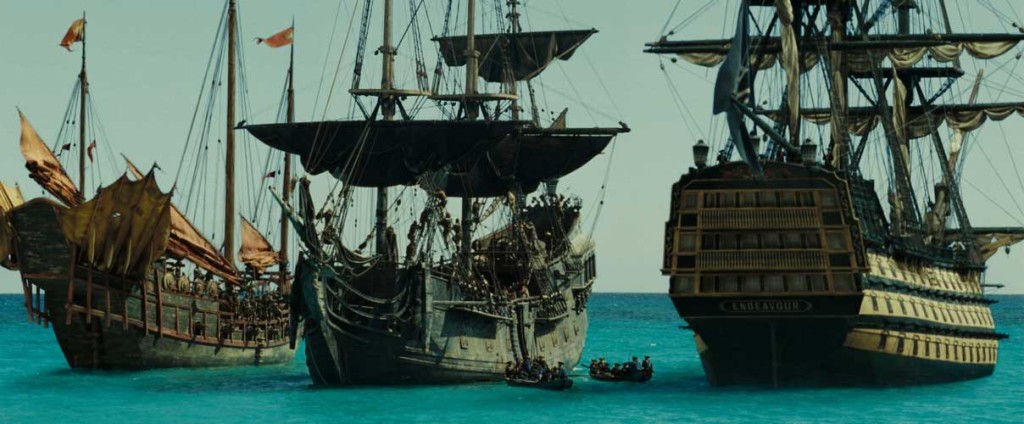
Olivier Misson becomes captain of the frigate
The frigate “La victoire” was on its way to the West Indies, the crossings were long and leisurely.
Misson and Caraccioli became friends and spent their time in intense conversations. Caraccioli’s ideas were deeply influenced by libertarian Deism, which denounced inequality and the nature of monarchy. Misson was thrilled and his Italian friend’s ideas matched his sense of adventure.
They began preaching their gospel to the crew.
In sight of Martinique, the ship was. “Victory” from an English ship, the “Winchelsea”, was attacked, and the battle was a terrible shootout that damaged both ships.
At that time, only the high officers had access to the dune. The two ships maneuvered parallel to each other, the English getting closer, as the captain of the “Winchelsea” ordered his shooters to fire and aim at the deck of the “Victory”.
Captain Forbin, the second captain, and the two lieutenants were killed by this gust.
The “Victoire” (the victory in French) was victorious, but after that
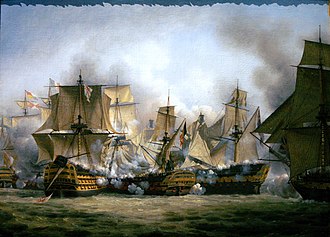
They did not want to return to Lorient, even if it meant becoming outlaws, and who would come after them?
They chose MISSON as captain, the only surviving and brave officer, and the monk CARACCIOLI as lieutenant.
And so began an unusual adventure.
A DEO A LIBERTATE – FROM GOD AND FREEDOM
And so these two will try to cultivate the flowers of freedom, equality, and brotherhood against the current, surrounded by people whose minds, like. As we can imagine, was not touched by such worries.
It is said that MISSON immediately after taking command of the “Victoire” will propose to the former monk CARACCIOLI to restore freedom in the world.
Misson and Caraccioli decide with the crew to change course: no more thankless tasks for an ungrateful king, they will now work alone.
The new pirates have a dream: to find an uninhabited place where they can establish a society that.
Free from the feudal, racial, and religious burdens of their time.
They will set sail for new waters, where there is still land to be claimed, where not every ship is that of a pirate or warship.
They want to search for lesser-known places, where there are peoples who still live as innocently as on the first day.
There we must seek our fortune, not in the seas that have decayed with all of Europe’s desires!
On the other side of Africa!
Cape to the Indian Ocean, it is vast and almost empty.
The frigate left the Caribbean for the Indian Ocean, and more specifically. Hoffnung, vor der Küste der Komoren und im Golf von Guinea, kaperten Piraten zwei holländische Schiffe, darunter die “Nieuwstaak”, die mit schwarzen Sklaven beladen war und beschlagnahmt wurde. Für Kapitän MISSON war dies die Gelegenheit, seine Doktrin gegen die Sklaverei durchzusetzen und den Menschenhandel zu verbieten.
Es war ein mutiger Schritt, der damaligen Standards widersprach, aber die Besatzung begrüßte ihn herzlich. Die Sklaven wurden befreit und in die Besatzung integriert, um Gerechtigkeit, Freiheit und Menschlichkeit zu fördern.
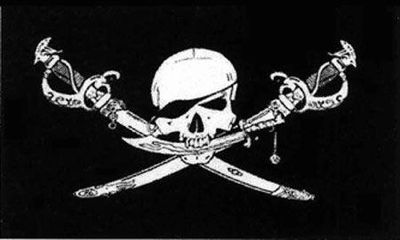
CARACCIOLI distributed these individuals, who came from different backgrounds, as best as possible and took command of this ship, which had been named “BIJOU.”
With these two ships, Captain MISSON anchored near the island of Moheli in the Comoros, where they stayed for several months and many of them took local women as companions.
Later, MISSON decided to set sail back towards Madagascar.
Along the coast of Mozambique, on the sea route. In Madagascar, they captured a Portuguese ship.
The history of the First Pirate Republic begins in Madagascar.
Everyone is equal to each other, the Malagasy Republic of Libertalia, a society founded on prohibitions that abolished all distinctions based on race, religion, and class, has inspired many writers and posed a real challenge for historians.

Over the centuries, the epic At Libertalia Republic, the heads of aspiring pirates, anarchists, writers, government officials, and even historians are turned.
The two ships arrived in Diego-Suarez around 1685 or 1690. (The archives have disappeared, and only through the reports of surviving sailors could this story be attributed to the years 1685 to 1690).
There they drop anchor, the bay turns out to be an exceptional natural harbor.
Captain MISSON and the crew of the “Victoire” and the “Bijou” explore the surroundings, the ground appears fertile to them, the air healthy, a river flows there, the forest is close.
They are thrilled, a perfect position for pirates and a charming place.
Misson decides to settle and opens it to his companions, all in agreement, and the 1st Republic “LIBERTALIA” is established.
Misson and Carassioli convinced the crew to found the ideal society.
This colony would have been much more than a simple asylum for pirates and buccaneers: it was a true political, social, and philosophical utopia, the modern equivalent of Atlantis or Eldorado and the precursor of the French Revolution of the following century.
Among its members, whose number increased with each conquest as a large part of the crews gathered, were French, English, Dutch, Portuguese, liberated former slaves. Female passengers of the hijacked ships, women from the Comoros who followed the sailors.
His people will now bear the name “Liberi”, free men and women, and the republic will be called “LIBERTALIA”, the land of freedom.

All proud and equal, all united for the good of all, 10 nations in one.
Caraccioli realizes his dreams of a perfect world, without distinction of race, religion, or class.
Decisions are made collegially and democratically, with men organizing themselves in groups of ten pirates, led by a representative who, along with other elected officials, enacts the laws of the republic.
At that time, the northern part of the island of Madagascar was sparsely populated, or so it was thought.
The Malagasy tribes were at war with each other, yet contacts were made with the nearest Sakalava tribe, exchanging goods such as fabrics, axes, and other items for food: cattle, goats, rice, etc.
The free men organized themselves into groups of ten. In each group, individuals selected a representative to establish rules and laws to govern “LIBERTALIA.”
Numerous structures are built within the enclave, and after the construction of the parliament house and an ecumenical church or temple, everyone helps in building their houses.
A port, a dock, a boat repair yard, and the rebuilding of the aging “Victory” were constructed.
The treasure and herds are distributed, and each becomes the owner of the land they cultivate. The community becomes prosperous, the cleared fields are sown, and oxen are bought from the Madagascans.
However, most of them are. especially sailors, and many continue pirate activities with chosen crews.
Europeans and Blacks equally distributed (says the chronicler of the time) according to their abilities.
Because Misson ordained absolute equality among all races, he symbolizes his anti-racism by mixing different skin colors in meetings, and after precise measurements.
The city is developing and the warehouses were filled with gold and goods.
The captured crews could choose whether to join the republic, they learned the language and naturally applied the laws and regulations, slaves were freed.
The community of “LIBERTALIA” is becoming richer and wealthier. But for a pirate, the words “future” and “hope” hold little meaning.
It was not a nest of vermin that he had in sight, but a peculiar colony, both warlike and idealistic.
Yet even here, leniency was shown towards the prisoners, except for the traitors who were hanged.
After a few years, the harbor filled with ships, the new city, now a proper town, grew larger and larger.
The colony, with about 1500 inhabitants, was flourishing more than ever.
There were births, and Captain Caraccioli was already ensuring that these children and their parents, who almost all had. Illiterate people were, libertarian alphabet books were printed.
Education, he repeated over and over, is the foundation of all progress.
 The unexpected downfall of Libertalia
The unexpected downfall of Libertalia
The forest behind the city echoed with a thousand rustling sounds one day in the year 1697.
With trained eyes and ears, he would have noticed the flight of birds and the fear of the cattle, but no one expected the danger from the forest.
The cannons were aimed at the bay, and the entire fortification of Libertalia was facing the ocean.
Aligned and no one had expected the treacherous attack of the Madagascans from the mainland.
And maybe it was just the wind that made the bushes tremble?
At the edge of the forest, the Madagascans were ready.
The nephew of the king of the Antakaras tribe, this great warrior who had managed to reunite the other tribes by keeping the promise of the colony’s wealth, and who knew from spies that he was sent to trade with the Liberals, that the ships had sailed at sea and that the city had much fewer men.
Everyone was going about their business when suddenly the cannon thundered. It was not noon, it was the alarm.
The bay was empty, the screams came from elsewhere.
The Madagascans!!! …how could they approach without being seen?
All heights were covered by locals. There were thousands of them, and today they did not come to negotiate.
They had already taken the city from behind, the inhabitants of Libertalia were surprised and overwhelmed.
Not a cannon was aimed at the hinterland, they were already blaming themselves for protecting the entrance to the bay and forgetting the threats from the land.
Who would have thought that stick carriers, almost naked savages,
Could pose a threat!
And here the locals attacked with such force that they seemed able to overturn everything.
The enemy was far more numerous than them, and their element of surprise had been cleverly calculated. By coming down everywhere at once, the Madagascans had disorganized the defense that the Libertalia had abandoned at the edge of the forest.
It was the stampede, the refugees began to run towards the ships… On board, they would be safe.
The houses were burning, the city was in flames. Two ships managed to set sail with some brave men under Misson’s leadership and a portion of the treasure.
During the
During the night, the colony was completely destroyed and looted…
French Bay (Baie des Français)
In the bay of Diego-Suarez, there is nothing left of what “LIBERTALIA” once was.
Nothing remains of Misson and Caraccioli’s dream, everything is reduced to nothing.

Caraccioli died during the attack in Libertalia, Misson later perished in the middle of a storm in the Atlantic.
Life.
Tew went back to sea and piracy and was killed by a cannonball.
There were survivors whose fate remains unknown, some of whom surely became the ancestors of the Zanamalata.
Madagascar remembered anyway, it is said that a tribe from the northeast coast, fearsome sailors, dangerous plunderers, until the last century, owed their boldness at sea only to the descendants of pirates who had taken root.
The Descendants of Pirates in Madagascar
What remains of this utopian dream?
Today, there is nothing left of Libertalia, no archaeological traces, no documents.
Does this original fire still burn, or have these utopians forged their belief in freedom, equality, and brotherhood?
This smoldering ember, which sometimes flares up again when people begin to believe that they can be brothers and that the world will follow them.
The buccaneers who befriended Malagasy women even left descendants – the Zana malata.
A living myth
The story of Misson and Caraccioli was written by Charles Johnson in Volume II of A General History of the Robberies and Murders of the Most Notorious Pyrates. The history of the robberies and murders of the most notorious pirates is told in the book “A General History of the Pyrates”, published in London in 1724. This book has been picked up, shaped, and even reinvented by many historians over several centuries.
Issue: Strong suspicions make Johnson a pseudonym for the novelist, adventurer, and merchant Daniel Defoe, the author of the famous Robinson Crusoe. Defoe took malicious pleasure in passing off his dreams as reality and was close to British radicals who advocated for the sovereignty of the people ahead of their time.
It was only at the beginning of the 20th century that Anglo-Saxon historians referred to the Libertalia episode as a “hoax”, and a few decades later, their French counterparts agreed.
Among colleagues, there are still a few die-hards who believe in Libertalia, whether they are amateurs of piracy or fighters for left-wing liberalism.
Pierre van den Boogaerd, author of a beautiful book about the wrecks of Madagascar (Le Grand Livre des épaves de Madagascar, ed. Orphie, 2010), is one of them.
For him, there is no doubt that “Libertalia existed”.

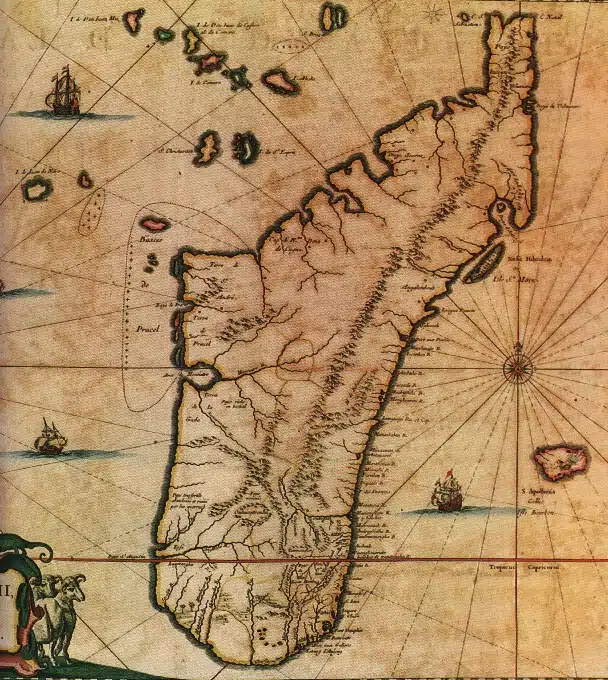
 The unexpected downfall of Libertalia
The unexpected downfall of Libertalia
